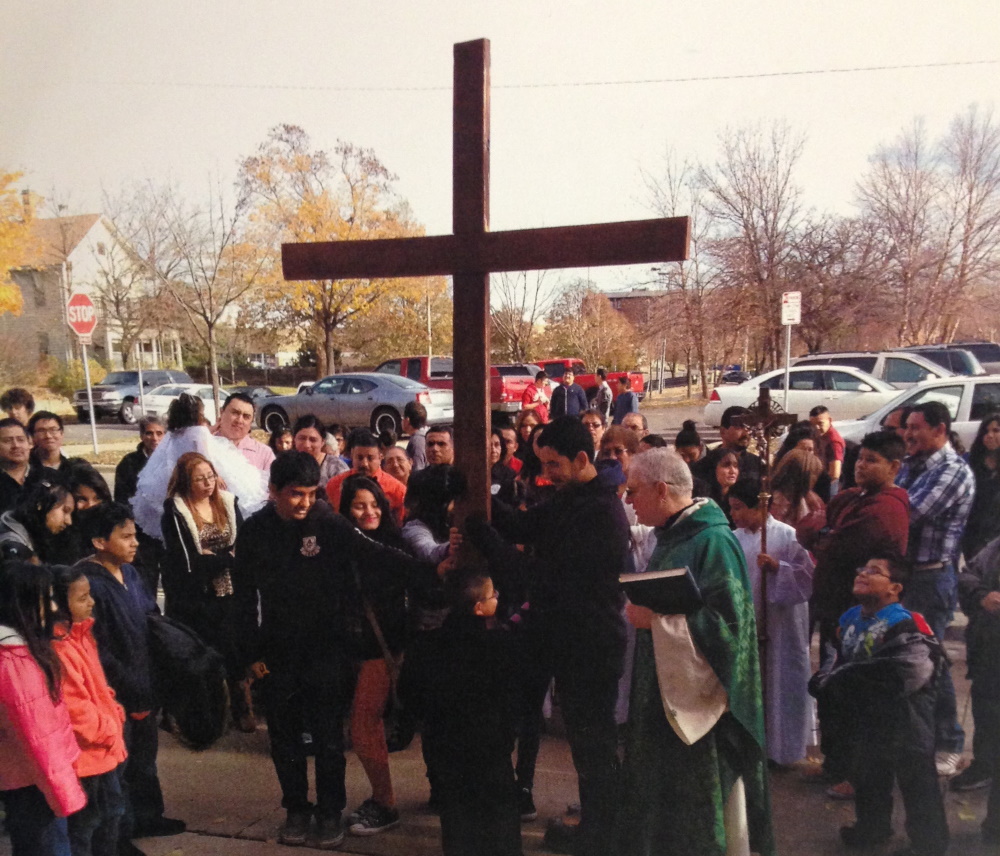
When the current translation of the Rite of Christian Initiation of Adults was promulgated in 1988, we might not have been as prepared as we need to be. Because we weren’t quite ready, many misinterpretations and misapplications of the rite began to flourish.
The biggest difficulty is that the Rite of Christian Initiation of Adults was never designed to be implemented in our parishes as they existed then. The rite envisions a renewed parish with the full, conscious, and active participation of the baptized priesthood active in the mission of spreading the gospel.
The new translation of the Rite of Christian Initiation of Adults gives us a second chance to prepare our parishes for its implementation. The new translation is still several years away from being published, and now is the time to start getting ready.
These are some of the changes we will need to embrace.
The Rite of Christian Initiation of Adults leads seekers into relationship with Jesus, not into a school
The most important thing we must do is let go of the “school model” of catechesis, a paradigm that Archbishop Rino Fisichella, president of the Pontifical Council for the Promotion of the New Evangelization, called a “chokehold” on effective catechesis (press conference, June 25, 2020).
In the school model, everyone follows a predetermined one-size-fits-all schedule and curriculum focused on presenting doctrine organized by topics. This methodology is so prevalent that many parish leaders believe it to be prescribed.
However, Pope Francis reminds us: “Pastoral ministry in a missionary style is not obsessed with the disjointed transmission of a multitude of doctrines to be insistently imposed.” Over and over, the pope urges us “to concentrate on the essentials, on what is most beautiful, most grand, most appealing and at the same time most necessary” (Joy of the Gospel, 35).
The Rite of Christian Initiation of Adults is a process of conversion for unbaptized persons
The catechumenate is not for parishioners to learn more about the faith, baptized practicing Catholics preparing only for Confirmation, or faithful Christians becoming Catholic. They are all already living the Christian life. They may need more formation—as we all do—but they do not need to learn the basic disciplines of following Christ because they already are.
Most people we put into our parish adult initiation processes don’t belong there. But we put them there because it’s often the only adult faith formation happening in a parish. This results in catechumenate processes focused less on discipleship in Christ and more on information about Catholicism. The latter is important, but it is not the purpose of the catechumenate.
Conversion happens by encountering the entire mystery of Christ unfolding throughout the liturgical year
In life, there is no season for falling in love or deadline for getting married. Falling in love with Christ is similar. The Spirit doesn’t just work from September to May, and you can’t pre-determine God’s timeline.
We need to be ready whenever the Spirit opens a seeker’s heart. When that happens, we can immediately introduce seekers to Christ because the celebrations of the liturgical year are happening every day! And we share with them the entire mystery of Christ throughout the whole liturgical year, not just a part of it. This is why the rite says: “The time spent in the catechumenate should be long enough—several years if necessary—for the conversion and faith of the catechumens to become strong.” However, “the duration of the catechumenate will depend on the grace of God….Nothing, therefore, can be settled a priori” (RCIA 76).
Initiation is a ritual process
That may seem obvious, but often our practice and policies treat it more like a catechetical program with occasional prayers. The Rite of Christian Initiation of Adults is first and foremost an official rite of the church. Therefore, it is not optional or simply one method of adult initiation among many.
Moreover, when the church prays, Christ is present, teaching us to become like him. The rites, as Pope Benedict XVI said about the liturgy, are “the permanent catechesis of the Church, the inexhaustible source of catechesis” (62nd Italian Liturgical Week, 2011) and, as the Catechism states, “the privileged place for catechizing the People of God” (1074).
Initiation is the responsibility of all the baptized
There is no mention in the rite of an “RCIA team” or “RCIA group.” This is because the process of conversion happens in the midst of the community of the faithful (see RCIA 4 and 9). Instead of having catechumens meet only with a catechist once a week, our “RCIA teams” can coach all our parishioners to be mentors and examples for the catechumens any time they are with them.
This isn’t as hard as it sounds. Parishes, by definition, are spiritual communities that manifest Christ in everything they do. So we can intentionally embed seekers into the parish community (and not merely into a separate “RCIA community”) where they will regularly encounter Christ and learn to live as disciples through the life of the parish.
Becoming a disciple is not an acronym
We have a decades-long history of referring to the adult initiation process by the initials “RCIA.” This is unfortunate because it’s insider vocabulary. And it’s too easy to think of those initials as an academic program to complete or an exclusive club to join instead of a relationship with Jesus Christ that changes everything. When the new English translation is approved by Rome (which has not yet happened), the title will be the “Order of Christian Initiation of Adults.” Now is the perfect opportunity to use language that is more descriptive of what the Spirit desires for all of us and more inviting to those who seek the living God.
We may not have been ready for the full implementation of the Rite of Christian Initiation of Adults in 1988. Let’s make sure we’re ready by the time the new translation is published in a few years.
Your Turn
What has your parish already done to get ready for the new translation? What are you planning to do in the coming year? Share your thoughts in the comments below.
(This article is adapted from an article that appeared in the National Catholic Reporter.)












Where does informing/ orienting pastors into this mindset and practice take place?
Hi Katherine and all. Diana sent a private reply about this to Katherine. We didn’t post in comments because it’s kind of long. Diana’s reply will show up as a blog post in the next week or two. Watch the weekly newsletter or this space.
Here is the link to Diana’s post:
https://teaminitiation.com/2022/04/how-do-priests-learn-about-the-principles-of-the-catechumenate/
I can attest to the fact that for the past 15 years of my involvement in the “Team”, the folks progressing through the process oftentimes become far more involved in the parish and its ministries than “cradle Catholics”. Well over half of the participants dive right into the Church liturgical year cycle. I am just so thankful every Sunday when I look around the Sanctuary and see the families that have become a wonderful part of the body of Christ. Perhaps our local adaptation of the process comes with a bit of what we call Hoosier Hospitality here in Indiana. I know one thing for sure…without the catechesis the folks won’t understand what makes we Catholics the fullness we preach.
Thanks for your comment, Bruce. Hospitality is so important! It should like you are doing great work. Thanks for your commitment.
Parish leaders need to be educated in the new Order of RCIA if they choose to be evangelists. I have worked in the RCIA process for many years at different parishes and have found the parish priests and deacons had very little training. What you have stated is so true.
Most Pastors don’t see themselves involved in this process and don’t understand the RCIA process. The young pastors are very clerical and see this as a control problem for them. These are the ones who think RCIA is just about getting people who want the sacraments and become Catholics quickly. One told me his seminary training included one class on RCIA. This man now has his own parish.
The bishops need to lead and train pastors, deacons, and lay catechists well this time around!
So, from what I understand so far, there will be no Part II.2, 3, 4, 5 of the Rite. I’m sure that Part II.1 particular circumstances for children will appear somewhere. an amendment, maybe? Will there be a need for a second parish team for sacramental growth and formation of Christians baptized in another denomination. A different Rite book or ritual for example?
Will the new RITE be available soon?
Hi Gloria,
No, your information is not correct. All of part II is still included in the proposed translation of the U.S. edition of the Order of Christian Initiation of Adults. The earliest possible date for a published text of the new translation is late 2023. If past history is a guide, it could very likely be later than that.
To see all of our posts on the new translation, go to https://teaminitiation.com/tag/ocia/
Also, see this video: https://youtu.be/ftlxrfsfXNo